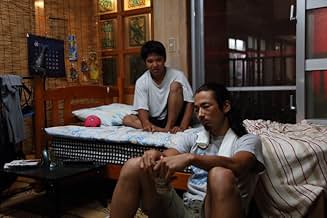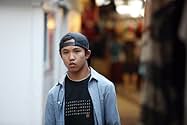Ikari
- 2016
- 2h 22min
VALUTAZIONE IMDb
7,0/10
3576
LA TUA VALUTAZIONE
Aggiungi una trama nella tua linguaA grisly unsolved murder links three seemingly unrelated stories in three different Japanese cities.A grisly unsolved murder links three seemingly unrelated stories in three different Japanese cities.A grisly unsolved murder links three seemingly unrelated stories in three different Japanese cities.
- Premi
- 4 vittorie e 21 candidature totali
Recensioni in evidenza
Rage (Ikari) is a Japanese suspense mystery drama film directed by Lee Sang-il and based on Shuichi Yoshida's mystery novel, following the same creative partnership behind their recent highly anticipated film Kokuho (National Treasure).
The film weaves together parallel narratives - the hunt for a murderer across three locations and the intimate examination of trust and human connection - creating a complex exploration of both mystery and the fragility of human relationships.
"The request was for one theme, one motivational motif that would start out sounding like 'distrust' and gradually transform into 'trust' as the film progressed," says Sakamoto.
"What the director most wanted to explore was this human dynamic between distrust and trust - whether some form of love could emerge from that tension. It seems that's where his focus was."
Through many exchanges with the director and his persistent creative demands, Sakamoto crafted music that masterfully captures the complex emotional depths of modern humanity.
The melody repeats the same phrase while evolving gradually, enveloping the anger and grief that live within the film and transforming it into beautiful music.
"This time, I went to Seattle to record the live string parts with the same musicians who played on 'The Revenant.' We got a really good sound and great performances.
For 'Rage,' while it has elements similar to 'The Revenant,' I tried to create something with a broader range of listening possibilities.
Since I have this work, I want to go up the stairs one by one, even if they're small steps, so that's how I approach it.
Review written by artist jayakumar.
The film weaves together parallel narratives - the hunt for a murderer across three locations and the intimate examination of trust and human connection - creating a complex exploration of both mystery and the fragility of human relationships.
"The request was for one theme, one motivational motif that would start out sounding like 'distrust' and gradually transform into 'trust' as the film progressed," says Sakamoto.
"What the director most wanted to explore was this human dynamic between distrust and trust - whether some form of love could emerge from that tension. It seems that's where his focus was."
Through many exchanges with the director and his persistent creative demands, Sakamoto crafted music that masterfully captures the complex emotional depths of modern humanity.
The melody repeats the same phrase while evolving gradually, enveloping the anger and grief that live within the film and transforming it into beautiful music.
"This time, I went to Seattle to record the live string parts with the same musicians who played on 'The Revenant.' We got a really good sound and great performances.
For 'Rage,' while it has elements similar to 'The Revenant,' I tried to create something with a broader range of listening possibilities.
Since I have this work, I want to go up the stairs one by one, even if they're small steps, so that's how I approach it.
Review written by artist jayakumar.
This Japanese mystery/drama is made up of three concurrent stories centring on enigmatic strangers who enter the orbits of trusting individuals from different Japanese cities, while a grim double-murder investigation plays out in the background. In Chiba, an ex sex worker forms a relationship with a taciturn young man whom her father is wary of, a confident gay man begins a relationship with a quiet and mysterious man he met in a seedy joint in downtown Tokyo and a young lady newly arrived in Okinawa befriends a drifter who lives alone on a nearby island.
I must say that I found this film to be pretty riveting from start to finish. The detective strand of the story takes a bit of a back-seat while the three main plot strands propel forwards. But the whodunit aspect remains extremely compelling and I was gripped to the end. The various stories all play off feelings of trust/mistrust in regard to how the trio of strangers are perceived and treated by the people they come into contact with. The acting by the ensemble cast is very strong throughout and the different dramas all have a strong dramatic punch to them. The film is pleasingly unpredictable and it really is difficult working out how it is going to play out, which is of course a big bonus for a mystery movie, but while the ending was satisfying it might have been slightly less than the journey getting there. This is a fairly minor complaint as this as a whole is a very strong bit of Japanese cinema. Be warned though, there is one extremely harrowing scene mid-way through the picture which was hell of a difficult to watch and very emotionally tough indeed. A couple of folks at the screening I attended walked out at this point in actual fact, I won't say any more as its best to go into this with no prior knowledge as it is a key scene. So, it is a film which is definitely tough in places. It is a very impressive bit of work though, with strong dramatics underpinned by a compelling mystery framework and it is well worth seeing if you can take films with disturbing content.
I must say that I found this film to be pretty riveting from start to finish. The detective strand of the story takes a bit of a back-seat while the three main plot strands propel forwards. But the whodunit aspect remains extremely compelling and I was gripped to the end. The various stories all play off feelings of trust/mistrust in regard to how the trio of strangers are perceived and treated by the people they come into contact with. The acting by the ensemble cast is very strong throughout and the different dramas all have a strong dramatic punch to them. The film is pleasingly unpredictable and it really is difficult working out how it is going to play out, which is of course a big bonus for a mystery movie, but while the ending was satisfying it might have been slightly less than the journey getting there. This is a fairly minor complaint as this as a whole is a very strong bit of Japanese cinema. Be warned though, there is one extremely harrowing scene mid-way through the picture which was hell of a difficult to watch and very emotionally tough indeed. A couple of folks at the screening I attended walked out at this point in actual fact, I won't say any more as its best to go into this with no prior knowledge as it is a key scene. So, it is a film which is definitely tough in places. It is a very impressive bit of work though, with strong dramatics underpinned by a compelling mystery framework and it is well worth seeing if you can take films with disturbing content.
Not to be confused with the Nicolas Cage film with the same movie title, "Rage" follows 3 different story/relationship, each involving 3 main characters within the group, where one of them may end up being the suspect. Of course it involves rage, but also mistrust.
There really aren't that many powerful Japanese films that keep you engaged from start to finish. However, this is one of those rare interesting/powerful films that is definitely worth checking out. It does make you want to keep watching to see how it's going to end and who the suspected killer is that's on the loose.
The film does not hold back at all covering many controversial subjects like homosexuality/gay club prostitution, rape, Okinawa/US Soldier problem. These are actual real-life issues.
This film is definitely not something you watch with your entire family; it will definitely make you feel uncomfortable.
There is nudity and some extremely depressing uncomfortable scenes that is almost too graphic and realistic. I could not help it but cry and REALLY feel for the character, the impact was so big; it will leave you with rage too.
I think the beginning of the film was more powerful than the climax. The climactic scene maybe could have been better... Nevertheless, it is a film that stays with you even days later.
Excellent all-star casting. Aoi Miyazaki really fits the clumsy air-headed prostitute daughter of Ken Watanabe. Satoshi Tsumabuki really put himself out there playing a gay character in the closet. Suzu Hirose, super cute and recently popular actress, playing the girl from Okinawa was quite powerful.
Powerful performances and great music to go with the film.
It is definitely a movie I would put on my top list of Japanese films. Sang-il Lee is definitely also one of the best directors in Japan.
Worth watching!
There really aren't that many powerful Japanese films that keep you engaged from start to finish. However, this is one of those rare interesting/powerful films that is definitely worth checking out. It does make you want to keep watching to see how it's going to end and who the suspected killer is that's on the loose.
The film does not hold back at all covering many controversial subjects like homosexuality/gay club prostitution, rape, Okinawa/US Soldier problem. These are actual real-life issues.
This film is definitely not something you watch with your entire family; it will definitely make you feel uncomfortable.
There is nudity and some extremely depressing uncomfortable scenes that is almost too graphic and realistic. I could not help it but cry and REALLY feel for the character, the impact was so big; it will leave you with rage too.
I think the beginning of the film was more powerful than the climax. The climactic scene maybe could have been better... Nevertheless, it is a film that stays with you even days later.
Excellent all-star casting. Aoi Miyazaki really fits the clumsy air-headed prostitute daughter of Ken Watanabe. Satoshi Tsumabuki really put himself out there playing a gay character in the closet. Suzu Hirose, super cute and recently popular actress, playing the girl from Okinawa was quite powerful.
Powerful performances and great music to go with the film.
It is definitely a movie I would put on my top list of Japanese films. Sang-il Lee is definitely also one of the best directors in Japan.
Worth watching!
Saw this film at TIFF (Toronto International Film Festival) yesterday. It is a somewhat lengthy Japanese film (2+ hrs) with strong acting and interesting storyline. Most films covering similar topics--unsolved crime, mysterious loner, young lovers, homosexual relationship--would have ended up clichéd and boring after an hour but this film definitely kept me interested throughout.
Unfortunately, I feel the ending weakens the film. The way the crime details were revealed at the end seemed rushed and wasn't as imaginative as the rest of film. Overall, a good film worth watching if you are looking for a foreign film with crime drama plot.
Unfortunately, I feel the ending weakens the film. The way the crime details were revealed at the end seemed rushed and wasn't as imaginative as the rest of film. Overall, a good film worth watching if you are looking for a foreign film with crime drama plot.
RAGE is the second attempt of Lee Sang-il, a Japanese filmmaker of Korean extraction, at adapting Shûichi Yoshida's popular novels, the first being VILLAIN (2010), a critical succès d'estime, both films ostensibly inspect the malaise of a contemporary society built upon a lurid murder case.
A couple is cold-bloodedly liquidated in their home, one year later, three strands (taking place in Chiba, Tokyo, and Okinawa respectively) of narratives are cogently intersected when the police corroborate that the suspect has undergone a facelift and is on the lam, all three story lines will be boiled down to a disintegration between the initially unsuspected and the possible perpetrator, and at the same time, the film meticulously keeps dangling audience with its ever-rotating guessing game.
In Chiba, a girl Aiko (Miyazaki) sloughed from a demimonde background by her father Yohei (Watanabe), strikes a relationship with Tetsuya (Matsuyama), a reticent young man with his past concealed; in Tokyo, a self-dependent gay man Yuma (Tsumabuki), lays his eyes on a reedy Naoto (Ayano) in his usual cruising haunt, after their first penetration, Yuma invites a homeless Naoto to live with him, but the latter remains unforthcoming to a fault; in Okinawa, drifter Shingo Tanaka (Moriyama) is hidden on a small island, after chancing upon a newly-arrived young girl Izumi (Hirose) and a local boy Tatsuya (Sakumoto), their fate will go through shifting sands when an unfortunate tragedy occurs.
Thus, Lee plies audience with 3 candidates of the murderer: Tetsuya, Naoto and Shingo, and cunningly teases viewers with alternate possibilities by dint of coalescing these three's attributes into one photoshopped end product (only one revealing shot in the elevator brazenly belies the eventually misled whodunit), actually, the film is not so much a police procedural as a carefully designed weepie gauging the tenuous degree of trust among human interactions, at least in the paralleled stories of Chiba and Tokyo, the issue of trusting the one you love in spite of his carapace hammers home in a treacly manner albeit two terrific performances from Miyazaki and Tsumabuki, the former blends convincingly her unadulterated immaturity with searing vulnerability whereas the latter, palpably inputs something warm, sympathetic and enthralling to flesh out a character very easily teetering on the brink of homosexual platitude. On the other hand, a transcendent Moriyama steals the limelight in the Okinawa chapter, where the film thrusts its "rage" mythos to the fore and reveals something rotten entrenched within (a slap to both islanders and foreigners), but newcomer Takara Sakumoto is unfortunate shy of charisma to match his rival here.
As a matter of fact, acting is the movie's strongest suit because the script itself takes liberty with many wanton coincidences and artistic license to facilitate plot progress, for example, is it really necessary to bluntly play up certain characters' taciturnity as if this is the only way to keep audience hooked without spilling the beans? Also, for my money, the movie errs on the side of being mawkish and blasé, other than taking its aim at a more rapier-like appraisal of its intriguing premise (cause of the crime), Lee's film is awash with sizzling emotions (cheek by jowl with Ryuichi Sakamoto's attendant score) but in the end of the day, it doesn't reach the echelon of superiority as far as the ultimate impact is concerned.
A couple is cold-bloodedly liquidated in their home, one year later, three strands (taking place in Chiba, Tokyo, and Okinawa respectively) of narratives are cogently intersected when the police corroborate that the suspect has undergone a facelift and is on the lam, all three story lines will be boiled down to a disintegration between the initially unsuspected and the possible perpetrator, and at the same time, the film meticulously keeps dangling audience with its ever-rotating guessing game.
In Chiba, a girl Aiko (Miyazaki) sloughed from a demimonde background by her father Yohei (Watanabe), strikes a relationship with Tetsuya (Matsuyama), a reticent young man with his past concealed; in Tokyo, a self-dependent gay man Yuma (Tsumabuki), lays his eyes on a reedy Naoto (Ayano) in his usual cruising haunt, after their first penetration, Yuma invites a homeless Naoto to live with him, but the latter remains unforthcoming to a fault; in Okinawa, drifter Shingo Tanaka (Moriyama) is hidden on a small island, after chancing upon a newly-arrived young girl Izumi (Hirose) and a local boy Tatsuya (Sakumoto), their fate will go through shifting sands when an unfortunate tragedy occurs.
Thus, Lee plies audience with 3 candidates of the murderer: Tetsuya, Naoto and Shingo, and cunningly teases viewers with alternate possibilities by dint of coalescing these three's attributes into one photoshopped end product (only one revealing shot in the elevator brazenly belies the eventually misled whodunit), actually, the film is not so much a police procedural as a carefully designed weepie gauging the tenuous degree of trust among human interactions, at least in the paralleled stories of Chiba and Tokyo, the issue of trusting the one you love in spite of his carapace hammers home in a treacly manner albeit two terrific performances from Miyazaki and Tsumabuki, the former blends convincingly her unadulterated immaturity with searing vulnerability whereas the latter, palpably inputs something warm, sympathetic and enthralling to flesh out a character very easily teetering on the brink of homosexual platitude. On the other hand, a transcendent Moriyama steals the limelight in the Okinawa chapter, where the film thrusts its "rage" mythos to the fore and reveals something rotten entrenched within (a slap to both islanders and foreigners), but newcomer Takara Sakumoto is unfortunate shy of charisma to match his rival here.
As a matter of fact, acting is the movie's strongest suit because the script itself takes liberty with many wanton coincidences and artistic license to facilitate plot progress, for example, is it really necessary to bluntly play up certain characters' taciturnity as if this is the only way to keep audience hooked without spilling the beans? Also, for my money, the movie errs on the side of being mawkish and blasé, other than taking its aim at a more rapier-like appraisal of its intriguing premise (cause of the crime), Lee's film is awash with sizzling emotions (cheek by jowl with Ryuichi Sakamoto's attendant score) but in the end of the day, it doesn't reach the echelon of superiority as far as the ultimate impact is concerned.
Lo sapevi?
- Colonne sonoreM21 Forgiveness
Written by Ryuichi Sakamoto
Performed by Ryuichi Sakamoto feat. 2Cellos
Courtesy of Sony Music Japan International
I più visti
Accedi per valutare e creare un elenco di titoli salvati per ottenere consigli personalizzati
- How long is Rage?Powered by Alexa
Dettagli
Botteghino
- Lordo in tutto il mondo
- 13.521.593 USD
- Tempo di esecuzione2 ore 22 minuti
- Colore
- Mix di suoni
- Proporzioni
- 2.35 : 1
Contribuisci a questa pagina
Suggerisci una modifica o aggiungi i contenuti mancanti





























